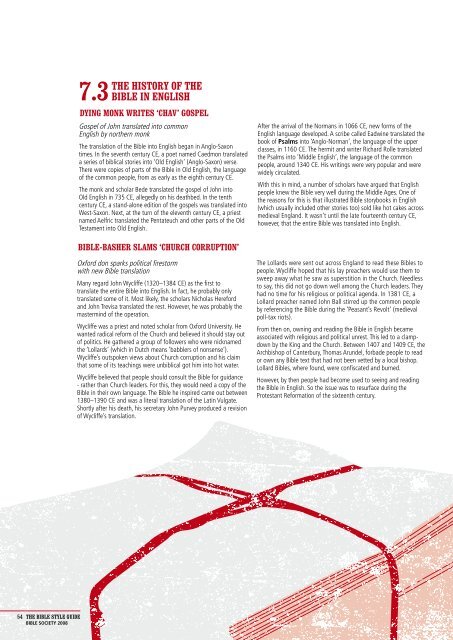BiBle STyle Guide - Get a Free Blog
BiBle STyle Guide - Get a Free Blog
BiBle STyle Guide - Get a Free Blog
You also want an ePaper? Increase the reach of your titles
YUMPU automatically turns print PDFs into web optimized ePapers that Google loves.
54 The <strong>BiBle</strong> <strong>STyle</strong> <strong>Guide</strong><br />
bible society 2008<br />
7.3<br />
the history of the<br />
<strong>BiBle</strong> in english<br />
dying monk writes ‘chav’ gospel<br />
Gospel of John translated into common<br />
English by northern monk<br />
The translation of the Bible into English began in Anglo-Saxon<br />
times. In the seventh century CE, a poet named Caedmon translated<br />
a series of biblical stories into ‘Old English’ (Anglo-Saxon) verse.<br />
There were copies of parts of the Bible in Old English, the language<br />
of the common people, from as early as the eighth century CE.<br />
The monk and scholar Bede translated the gospel of John into<br />
Old English in 735 CE, allegedly on his deathbed. In the tenth<br />
century CE, a stand-alone edition of the gospels was translated into<br />
West-Saxon. Next, at the turn of the eleventh century CE, a priest<br />
named Aelfric translated the Pentateuch and other parts of the Old<br />
Testament into Old English.<br />
<strong>BiBle</strong>-Basher slams ‘chUrch corrUption’<br />
Oxford don sparks political firestorm<br />
with new Bible translation<br />
Many regard John Wycliffe (1320–1384 CE) as the first to<br />
translate the entire Bible into English. In fact, he probably only<br />
translated some of it. Most likely, the scholars Nicholas Hereford<br />
and John Trevisa translated the rest. However, he was probably the<br />
mastermind of the operation.<br />
Wycliffe was a priest and noted scholar from Oxford University. He<br />
wanted radical reform of the Church and believed it should stay out<br />
of politics. He gathered a group of followers who were nicknamed<br />
the ‘Lollards’ (which in Dutch means ‘babblers of nonsense’).<br />
Wycliffe’s outspoken views about Church corruption and his claim<br />
that some of its teachings were unbiblical got him into hot water.<br />
Wycliffe believed that people should consult the Bible for guidance<br />
- rather than Church leaders. For this, they would need a copy of the<br />
Bible in their own language. The Bible he inspired came out between<br />
1380–1390 CE and was a literal translation of the Latin Vulgate.<br />
Shortly after his death, his secretary John Purvey produced a revision<br />
of Wycliffe’s translation.<br />
After the arrival of the Normans in 1066 CE, new forms of the<br />
English language developed. A scribe called Eadwine translated the<br />
book of Psalms into ‘Anglo-Norman’, the language of the upper<br />
classes, in 1160 CE. The hermit and writer Richard Rolle translated<br />
the Psalms into ‘Middle English’, the language of the common<br />
people, around 1340 CE. His writings were very popular and were<br />
widely circulated.<br />
With this in mind, a number of scholars have argued that English<br />
people knew the Bible very well during the Middle Ages. One of<br />
the reasons for this is that illustrated Bible storybooks in English<br />
(which usually included other stories too) sold like hot cakes across<br />
medieval England. It wasn’t until the late fourteenth century CE,<br />
however, that the entire Bible was translated into English.<br />
The Lollards were sent out across England to read these Bibles to<br />
people. Wycliffe hoped that his lay preachers would use them to<br />
sweep away what he saw as superstition in the Church. Needless<br />
to say, this did not go down well among the Church leaders. They<br />
had no time for his religious or political agenda. In 1381 CE, a<br />
Lollard preacher named John Ball stirred up the common people<br />
by referencing the Bible during the ‘Peasant’s Revolt’ (medieval<br />
poll-tax riots).<br />
From then on, owning and reading the Bible in English became<br />
associated with religious and political unrest. This led to a clampdown<br />
by the King and the Church. Between 1407 and 1409 CE, the<br />
Archbishop of Canterbury, Thomas Arundel, forbade people to read<br />
or own any Bible text that had not been vetted by a local bishop.<br />
Lollard Bibles, where found, were confiscated and burned.<br />
However, by then people had become used to seeing and reading<br />
the Bible in English. So the issue was to resurface during the<br />
Protestant Reformation of the sixteenth century.


